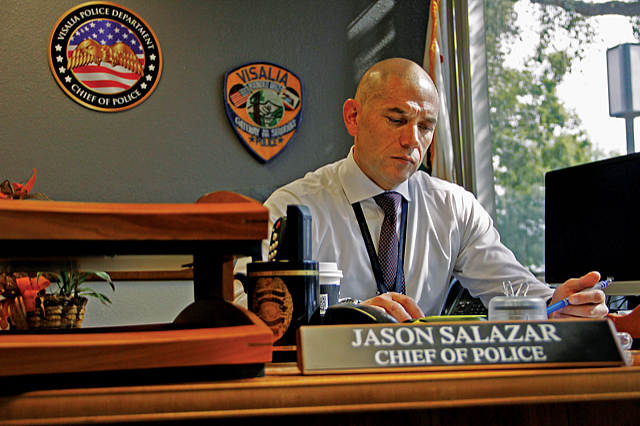In California’s Central Valley, lack of mental health training for police leads to fatal encounter

Anyka Harris holds balloons with messages from her and her family for her son Jontell Reedom, who suffered from schizophrenia and was shot by Tulare police officers.
(Photo: Paul Myers)
Jontell Reedom was a 27-year-old Tulare man. He was a football star in high school, well-liked by the community, but also a diagnosed schizophrenic. On March 12 of this year, two Tulare police officers approached Jontell after receiving a call that someone matching his description had been causing a disturbance in town. With the Tulare police department mum about the specifics of the interaction, we’re only left with a low-quality cellphone video capturing the incident.
In the final moments of Jontell’s life, viewers see him jogging away from the officers. When officers came within a close distance, they attempted to subdue him with their Taser. When Jontell continued to try and elude them, the confrontation led to blows for a brief moment.
Because of the obstructed view from passing cars, it is unclear what transpired between the officers and Jontell, although initial reports at the time say he had taken a baton from the officer’s belt. Seconds later the other officer fired eight rounds into him, eventually killing Jontell.
While the national conversation has focused on disproportionate rates of violence between police officers and the African-American community, Jontell’s mother, Anyka Harris, spoke about the need for police officers to be better trained in handling people with mental illness.
“We have some great police officers but what are we going to do about the issue of how they interact with mental health patients?” Harris said at a Tulare City Council meeting in March. “When are they going to get their training? Because they need it, and they need it now before someone else like my son is brutally murdered — executed!”
When I started looking into the case, I realize Anyka had made a truly powerful point about law enforcement training. I learned after officers leave the police academy, where cadets take a 15-hour Crisis Intervention Training (CIT) course, there is no mandate for officers to receive ongoing mental health training of any kind. Because there is not a mandate, there is not a place to collect data showing who has received training and for what department.
The rural police departments I spoke to in Tulare County – Exeter, Lindsay and Woodlake — said the number of patrol officers who have recently updated their training fluctuates. At the time I spoke with them in September 2018, Exeter’s department said six out of 18 officers had received additional training; Woodlake had trained four out of their 15 officers; and none of Lindsay’s officers had received training. And Lindsay faces a particularly dire situation because their officers pull double duty: they are also the city’s firefighters.
Determining the scope of mental health calls rural departments face over any given period of time was not a challenge for this project.
Visalia Chief of Police Jason Salazar said calls related to mental health between 2007 and 2017 grew by 900 percent. And most of those calls have been related to the growing homeless population in the area. As of this year, approximately 630 people are homeless in Tulare County and congregate in cities. Officers confirmed that a lot of their calls over mental illness are for homeless people they make contact with on a consistent basis.
Instead, the greatest challenge I faced was determining why officers were not getting training when the scope of mental illness was growing. The police chiefs I spoke to sounded nearly the same when they spooled out the reasons why. Because of scheduling conflicts, less than adequate staffing levels, and a lack of course availability, departments find it hard to schedule time off for officers to visit weeklong CIT courses. The problem only gets worse when officers have to travel out of the area.
However, there is a considerable effort to make it easier for Tulare County law enforcement to attend CIT courses.
Visalia Chief of Police Jason Salazar looks over paperwork in his office after discussing the merits of the HOPE team. Salazar says calls in regards to homelessness, the most public face of mental illness is Visalia, grew by 900 percent between 2007 and 2017. (Photo: Paul Myers)
The Visalia Police Department, among the largest law enforcement agencies in Tulare County, is taking the lead with the Tulare County Sheriff’s Office and the Tulare County Mental Health Branch to expand their free CIT course offerings.
Visalia is known for appropriately dealing with calls about homelessness and mental illness through the Homeless Outreach and Proactive Enforcement (HOPE) team. The team has been largely successful at defusing hostile situations between the mentally ill and public, with the aim of avoiding situations that could turn lethal.
Over the last five years, Tulare County CIT courses were offered twice a year. Each course is 40 hours and offers only 35 seats for all Tulare County law enforcement and some parole department personnel.
Shortly after looking into this story, the Tulare County Mental Health Branch said they planned to increase their class offerings. Their goal beginning in 2019 is to also increase the course size from 35 seats to 50. The chiefs I spoke to believe the increase in courses will make a dent in the number of officers who have not received the training. But with a growing homeless population in Tulare County, and with it the public visibility of severe mental illness, I plan to continue to cover whether more classes have given officers the additional training they require.

